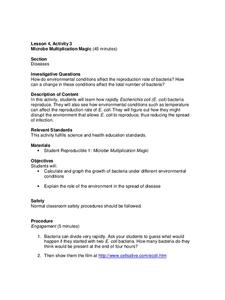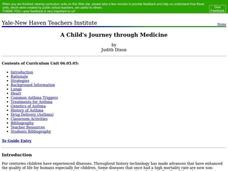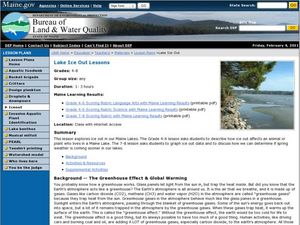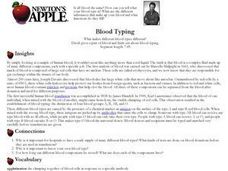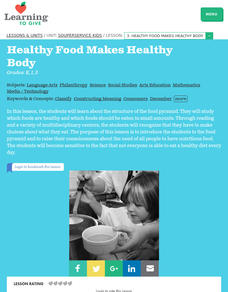Centers for Disease Control and Prevention
Microbe Multiplication Magic
A lesson introduces the reproduction rate of E. coli though a video. Then scholars complete a data table and graph of reproduction rates in ideal conditions as well as less than ideal conditions.
PBS
U.S. Agricultural Subsidies and Nutrition
Most young people don't spend a lot of time thinking about why some foods cost less than others. This resource uses clips from the documentary, Food, Inc. to explore the impact of agricultural subsidies on nutrition, health, and the...
Smithsonian Institution
Vaccines! How Can We Use Science to Help Our Community Make Decisions about Vaccines?
Uncover the fascinating world of vaccines in a multifaceted activity. Investigators explore community perception and the science of vaccines with eight tasks. Scientists continue their studies by giving and reviewing surveys, analyzing...
Centers for Disease Control and Prevention
Major Disparities in Adult Cigarette Smoking Exist Among and Within Racial and Ethnic Groups
Data indicates that some racial groups smoke more than others, and that with that racial group, there are smaller groups whose smoking habits vary as well. Secondary learners read a graph that details the differences between the Asian...
Curated OER
Death by Particles
Emerging epidemiologists define relative risk and read an article about the effect of particulate pollution on the cardiovascular health of women. They record the relative risk values, graph them, and answer analysis questions. This is a...
Curated OER
A Child's Journey through Medicine
Students experience a variety of activities that relate to human physiology and their functions. They create graphs and charts after testing their heart rates and blood pressure They conduct a survey of the student body and create ...
Curated OER
Viruses: Tiny But Deadly
In this viruses worksheet, learners read given information about the effect of viruses on people throughout history. Students create a bar graph comparing the viruses and answer seven questions based on the information they have learned.
Curated OER
Lake Ice Out Lessons
Students explore the greenhouse effect. In this environment instructional activity, students describe how "ice out" affects animals and plants who live in a Maine lake. Students graph "ice out" data and make predictions about...
Curated OER
What's Your Type
Students record their blood types on a class graph and calculate the potential number of blood donors for each group.
Curated OER
Adolescent Nutrition Scenario Worksheet
Not everyone has the exact same health needs- but what are the influencial factors? This activity breaks down nutritional requirements (RDA) through 4 different scenarios depicting different adolescents. Students answer questions about...
Curated OER
Science as Inquiry: what is starch and how can we test it?
Sixth graders discuss nutrients and examine foods for starch. In this starch testing lesson plan, 6th graders use iodine to test foods for starch and record their results. Students complete a worksheet and self reflection.
Curated OER
Nutrients by the Numbers
Students read and discuss an article on the amount of sugar in various food products. They compare the nutritional values of food products, calculate their daily intake of nutrients, analyze serving sizes, and compare/contrast their own...
Curated OER
What Causes Tooth Decay
Students investigate oral hygiene. In this personal health lesson plan, students discover the parts of a tooth and how to best protect them from disease. Students examine the effects of acids on tooth enamel and calcium.
Curated OER
They Don't Just Eat Grass
Students consider the USDA daily recommendations to create a "feed" product for middle schoolers. In this Health lesson, students learn about the ingredients in feed that is fed to livestock and apply the method to creating feed rations...
Curated OER
Measurement
Learners choose appropriate units of measure and predict length using the metric system. In this measurement lesson, students participate in activities in which they predict, measure, and record linear measurements such as arm span vs....
Curated OER
Heathly Foods Makes Heathly Body
Students examine and identify foods on the food pyramid. They catergorize food and place them on the correct level. They discover why they should eat foods in moderation.
Curated OER
Buddy, Are You Ready?-Preparing for School Emergencies
Students explore natural disasters by reading stories about volcanoes, earthquakes, floods, and hurricanes. They explore safe behaviors in order to understand what to expect in a catastrophe. Students practice safe evacuation procedures...
Curated OER
Arianna Travels the Orient Express
Fourth graders discuss how they eat when they travel. They resequence a letter that has been separated into pieces. They read the letter aloud, discuss the foods eaten by the writer and analyze whether she ate the right amount of food...
Curated OER
Health Education: An integrated Approach; Exit Drills in the Home
Third graders learn about fire safety in the home in order to plan escape routes while avoiding smoke inhalation. In this fire safety lesson, 3rd graders first discuss a smoke detector and its purpose, and then discover the importance of...
Other popular searches
- Inequalities Graphing
- Math Graphing Inequalities
- Inequalities and Graphing
- Algebra Graphing Inequalities
